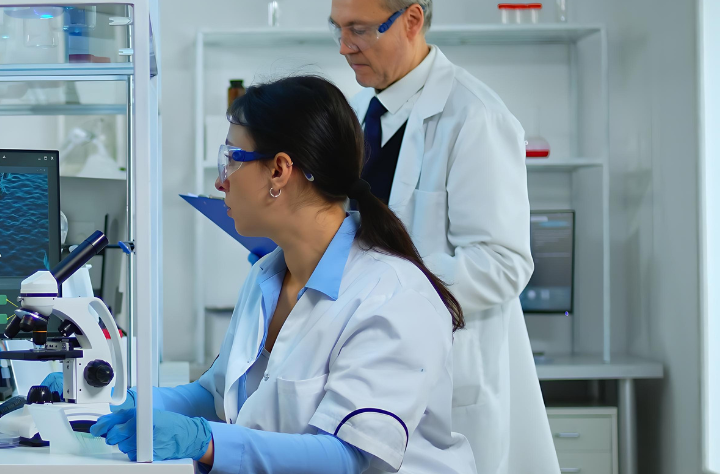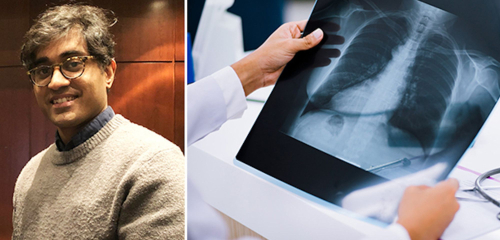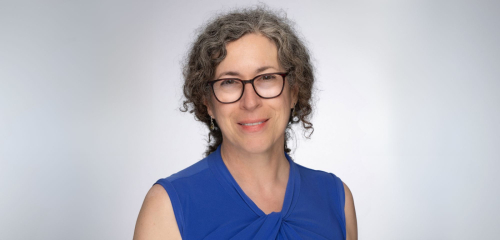Our comprehensive training program is fully accredited by the Royal College of Physicians and Surgeons of Canada. Like other respirology training programs in Canada, we have adopted the use of Competency by Design (CBD) in our program.
Program Overview
The primary mission of the McGill Respirology Training Program is to develop outstanding pulmonary specialists who will become future leaders in clinical medicine, education, and research. Our goal is to produce exemplary physicians who are knowledgeable, compassionate, and comprehensive in their approach to patient care. Our residents receive in-depth exposure to a wide spectrum of respiratory conditions and become experts in their management, ensuring they will serve as effective respiratory consultants with competencies spanning all CanMEDS domains. We also seek to foster the personalized career goals of our trainees whether it be in academia or community-based practice.
Program Benefits
Respirology at McGill University has a longstanding international reputation for outstanding clinical care, education, and research. For example, the Montreal Chest Institute has been recognized by Newsweek magazine as among the World’s Best Hospitals for multiple consecutive years. Several past presidents of the Canadian Thoracic Society, American Thoracic Society, and European Respiratory Society were trained at McGill. Our current training program builds on these proud traditions, preparing our residents to capitalize on emerging innovations and to become future leaders in the field. We are also strongly committed to the communities whom we serve and to the alleviation of health care disparities in patients suffering from respiratory diseases.
Program Strengths
Learning resources include a state-of-the-art simulation centre where the McGill bronchoscopy course is offered annually for all respirology training programs in the province of Quebec. We have a wide variety of unique ambulatory clinic experiences including our Respiratory Day Hospital which also serves as a learning centre for respiratory procedures and acute respiratory care. The Montreal Chest Institute is an immigration screening centre for tuberculosis, and we serve Indigenous patients by partnering with Northern Nunavik Health Services (Ullivik) and Cree Patient Services. The Division has two joint clinical rounds attended by all clinical faculty and trainees across all sites. The first is a weekly one-hour didactic presentation on various topics in respiratory medicine, which both faculty and fellows share responsibility for preparing on a rotating basis. The second is a weekly 90-minute review of cases from the consultation services, which is heavily focused on interpretation of chest radiology by the fellows and honing their clinical decision-making skills. Other highlights include a weekly academic half-day, a monthly journal club, and participation in M&M rounds. Residents are provided with funding to attend one respirology conference per academic year. PGY-5 residents are also financially supported to attend the Canadian Thoracic Society meeting.
Living in Montreal
Montreal is one of Canada’s oldest cities. Founded in 1642 by French colonists, Montreal is globally recognized as a major academic, industrial and cultural centre. Its unique mix of French and English cultures along with contributions from many other linguistic and ethnic groups has made Montreal a truly international city. Located on the St. Lawrence River, and built around Mount Royal, Montreal has a population of approximately 2 million. Montreal is also the perfect place for foodies; it is known for its vibrant culinary landscape that is greatly influenced by its culturally diverse population. Festivals are almost continuous during the summer months, with over 120 festivals to choose from throughout the year. There is easy access to surrounding lakes and mountains for the outdoor enthusiast, either in the Laurentiens or the Eastern Townships.
Program Duration & Pathways
The duration of the core residency training program is 2 years. Residents rotate through 3 of the McGill University-affiliated teaching hospital sites: the McGill University Health Centre / Glen site (contains the Royal Victoria Hospital and Montreal Chest Institute), the McGill University Health Centre / Montreal General Hospital (MGH) site, and the Sir Mortimer B. Davis Jewish General Hospital (JGH) site. Elective community hospital experiences are also available through St. Mary’s Hospital, the Lakeshore General Hospital, and Verdun Hospital. The program has 2 major streams: (A) Core Adult Respiratory Medicine Pathway, and (B) Respiratory Medicine Clinician-Scientist Pathway.

Core Adult Respiratory Medicine Pathway
Trainees complete at least 18 months of clinical training across diverse inpatient, outpatient, ICU, and specialized respiratory care settings.
Read More
Trainees spend a minimum of 18 months in clinical training, encompassing inpatient pulmonary consultation and ward services, ambulatory care clinics, general intensive care unit (ICU) training, a specialized Respiratory ICU, a specialized outpatient Respiratory Day Hospital, sleep medicine, pulmonary oncology and pathology, chest radiology, pulmonary physiology (including pulmonary function and cardiopulmonary exercise testing), and various elective options. There is extensive exposure to bronchoscopic and pleural procedures. In addition, 2-6 consecutive months (depending on trainee preference) are devoted to supervised research. The latter is performed in collaboration with renowned research units at the Meakins-Christie Laboratories (basic science) and the Respiratory Epidemiology and Clinical Research Unit (clinical-epidemiologic science), as well as other research units in the McGill ecosystem.

Respiratory Medicine Clinician-Scientist Pathway
Trainees pursuing academic careers may complete a fully funded third year of research in basic or clinical-epidemiologic science.
Read More
Trainees aiming for academic careers as independent investigators have the opportunity to obtain additional research training. After completing the Core Adult Respiratory Medicine Pathway, an additional and fully-funded third year of research training in either basic science or clinical-epidemiologic research methods is possible. Future clinician-scientists are encouraged to enroll in the Clinician Investigator Program of the Royal College of Physicians and Surgeons of Canada, which helps to prepare future researchers and involves concomitant registration in a graduate degree program (typically a Masters degree in either Clinical Epidemiology or Experimental Medicine at McGill University).
Curriculum
PGY-4 Rotations (4 weeks each) |
Site |
Number of Rotations |
|
Respirology inpatient/emergency room consults |
JGH, MGH, Glen |
4 |
|
Respiratory ICU (includes bronchoscopy/thoracoscopy) |
Glen |
1 |
|
Respirology Ward |
Glen |
1 |
|
General ICU |
JGH, MGH, Glen |
1-2 |
|
Pulmonary function testing (PFT) |
Glen |
1 |
|
Sleep medicine (includes sleep lab/polysomnography) |
Glen |
1 |
|
Pulmonary oncology |
JGH, Glen |
1 |
|
Ambulatory subspecialty clinics |
Glen, MGH, JGH |
1 |
|
Respiratory Day Hospital (includes bronchoscopy/pleural procedures) |
Glen |
2 |
|
Elective |
|
1 |
PGY-5 rotations (4 weeks each) |
Site |
Number of Rotations |
|
Respirology inpatient/emergency room consults |
JGH, MGH, Glen |
2 |
|
Respiratory Day Hospital (includes bronchoscopy/pleural procedures) |
Glen |
1 |
|
Specialized ambulatory clinics * These rotations are consecutive and the specialized ambulatory clinics during this period include: Tuberculosis, Asthma, COPD/Rehabilitation, Cystic Fibrosis, Home Ventilation, Lung Cancer, Occupational Lung Disease, Pulmonary Hypertension, Thoracic Surgery, Interstitial Lung Disease. During each week of the ambulatory rotation residents divide their time between these different clinics. |
JGH,Glen, MGH |
2 |
|
Sleep medicine (includes sleep lab/polysomnography) |
Glen |
1 |
|
Electives |
|
min 1/max 5 |
|
Advanced PFT |
Glen |
1 |
|
Junior attending experience (Ward/Day Hospital) |
|
1 |
|
Research *Up to 6 months of research are offered in the Core Adult Respiratory Medicine stream for individuals who are interested in going on to further research training in preparation for an academic career. |
|
min 2/max 6** |
|
Vacations are taken during consult and/or research rotations, for a total of 4 weeks/year |
||
Schedule
For PGY-4 Trainees: The primary goal during this first year of the program is rapid acquisition of the core knowledge and skills required for effective clinical management of the most frequent respiratory problems. This includes: 1) a systematic approach to the evaluation of respiratory diseases, 2) accurate interpretation of radiologic and physiologic studies (chest radiographs, chest CT, routine pulmonary function tests, exercise studies, polysomnography), and 3) learning standard bronchoscopic and pleural procedures, including ultrasound-guided thoracentesis. The McGill Bronchoscopy course for Quebec-based trainees and the McGill Pleural course are offered in the first two weeks of training. As residents enter the transition to discipline phase, they will have ample opportunity to acquire these skills and competencies through rotations on the consultation services, Respiratory Day Hospital, and Respiratory ICU. With appropriate supervision, the respirology residents ordinarily perform all bronchoscopies during these rotations. A thorough understanding of invasive and non-invasive mechanical ventilation, and emergency skills in airway management and vascular access, are additional learning goals. Elective choices are diverse, and can include lung transplantation (at Université de Montreal), chest radiology, occupational lung disease, thoracic surgery, pediatric respirology, community respirology and interventional pulmonology.
For PGY-5 Trainees: The main objectives during the second year of the program are: 1) consolidation of wide-ranging, up-to-date knowledge in respiratory medicine, including chest radiology and respiratory physiology, 2) mastery of procedural and consultation skills, and 3) increasing independence and autonomy as a respiratory medicine consultant. Specialized ambulatory clinics attended by residents during this year include (but are not limited to) tuberculosis, asthma, COPD/rehabilitation, lung cancer, pulmonary hypertension, thoracic surgery, cystic fibrosis, interstitial lung diseases, home ventilation, and sleep disorders. PGY-5 respiratory residents act as teachers for the Small Group Respiratory Physiology sessions of first year medical students at McGill. The residents also complete a research project during this year, which can involve either basic science or clinical/epidemiologic investigations. Research blocks range from 2-6 months depending upon the resident's desired career path and learning objectives. For residents planning a career in community respirology, a research project in quality assurance and improvement (QA/QI) is a popular option. For residents considering a research career in academia, 6 months of research is recommended. As residents enter the final phase of CBD, transition to practice, junior attending rotations are scheduled in the Respiratory Day Hospital, consultation service and inpatient respirology ward.
Application Process
The McGill Postgraduate Medical Education (PGME) Office has created a website that provides application processes for applicants. While the PGME website already has all the required information, we're providing extra support with quick links below to help you navigate the application process for Subspecialty Residency Training Programs (R4-R5) more easily.
| How to Apply: |
|---|
|
| Deadlines: |
|---|
|
| Program Descriptions: |
|---|
|
| Quick Links: |
|---|
Selection Criteria
We are looking for outstanding physicians and future leaders who are passionate about advancing respiratory health through disease prevention, improved access, quality improvement, advances in healthcare education, and research.
The selection criteria for successful applicants include the following attributes:
- track record of academic (including research) and clinical excellence
- intellectual honesty, curiosity, openness, and enthusiasm
- strong teaching skills and the motivation to transmit knowledge to others
- outstanding interpersonal skills with the ability to be a team player who is collaborative and respectful at all times, recognizing the roles and contributions of others
- engaged in self-directed learning and accepting of feedback
- professionalism including a strong sense of personal responsibility for the continuity of patient care (“taking ownership”)
Research in Residency
The Meakins-Christie Laboratories is the main site for basic science research in the Respiratory Division, whereas the Respiratory Epidemiology and Clinical Research Unit (RECRU) is a group primarily engaged in clinical trials and epidemiological research. Both are interdisciplinary research units, containing a mix of clinician-scientists and non-clinician PhD scientists. Residents are strongly encouraged to participate in the weekly research seminars and other activities conducted at the Meakins-Christie Labs and RECRU, particularly in the second year of the training program. The residents also present the results of their research projects at the annual McGill Respiratory Research Day.
 Dr. Nan Zhao
Dr. Nan Zhao



